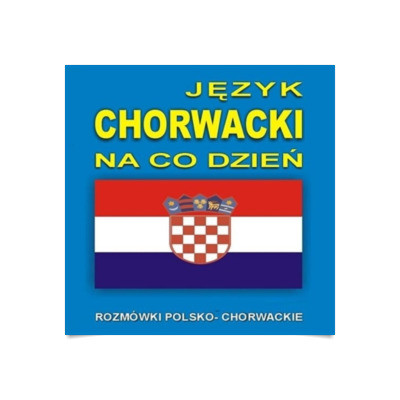 The language "Yugoslav”. Languages were spoken in the territory of Yugoslavia: Slovenian, Macedonian and "Yugoslav" (Serbo-Croatian). In fact, it was entirely artificial, created from two separate languages: Croatian and Serbian (they differ e.g.. in terms of phonetics, morphology, lexis and word formation).
The language "Yugoslav”. Languages were spoken in the territory of Yugoslavia: Slovenian, Macedonian and "Yugoslav" (Serbo-Croatian). In fact, it was entirely artificial, created from two separate languages: Croatian and Serbian (they differ e.g.. in terms of phonetics, morphology, lexis and word formation).
Croatian language. From the announcement in 1991 r. of independence, the official language of the country is Croatian. It belongs to the group of South Slavic languages.
Croatian ć is Polish part, ð (can be saved as dj) – Polish language, dź – two, h – ch (voiceless), lj – l "medium language (no equivalent in Polish), nj – is, s – sz,v -w, z – g. Croatian r corresponds to Polish, but e.g.. in the position between two consonants it is pronounced yes, as if it formed a syllable with a short y before it, e.g.. Hrvatska, we pronounce Chyrwatska, Krk - Church.
There is a moving accent in Croatian; in polysyllable words, it never falls on the last syllable. Croatian spelling is phonetic, that is, consistent with the pronunciation (it spells like this, how is it pronounced).
Foreign Languages. Tourism industry employees in Croatia (tourist information, hotel, restaurant) they almost always know – better or worse - German, English or Italian (spoken especially in Istria), and often single words and phrases in other languages, including in Polish. Eventually, with the good will of the interlocutors, in basic matters, you can speak the Polish-Croatian "dialect", helping each other with gestures. As the glossary below shows, many words sound similar in both languages.
greetings
hi god
good morning good tomorrow (morning), good afternoon (in the afternoon)
good evening good većer
goodbye dovidjenja
good night
welcome to the good side
happy sretan put road
tasty dobar teak
to health zivjeli
Basic phrases
please please or please (depending on the situation)
thank you hvala
yes he will
no no
I don't understand. I do not understand.
I want to say… I mean…
I want to ask… I want to ask…
How is it called? What's it called??
Where is? The clothes were there…?
crkva church
cantor exchange office
bank bank
postal mail
museum museum
gentlemen tavern
plot trg
street street
dear cesta
number, gun number
I can not find… I can not find…
left left
desno law
just right
open opening
closed zatvoreno
What time is it? What time is it?
I like Croatia very much. I really like Croatia.
I like the sea very much. I really like the sea.
Adriatic Jadran
hitna pomoć ambulance service
pharmacy pharmacy
Bolnica hospital
gas station
benzine gasoline
bezołowiowa bezolovni
oil oil
battery battery, battery
chłodnica refrigerator
warsztat workshop
(car) (mahanikarska)
Days of the week – week
Monday ponedjeljak
Tuesday utorak
Wednesday
Thursday cetvrtak
Friday petak
Saturday Saturday
Sunday nedjelja
Numerals – numbers
one one
two two
three tri
four fours
five pet
six a.m.
I sit seven
eight wasp
nine devet
ten deset
Shopping – purchase
Where can i buy? Where can I buy?
How much it costs? How much does it cost?
expensive purchase
cheap
shop decision
Food -jelo
to eat and
drink drink
kruh bread
chai tea
coffee coffee
pivo beer
knead cake
be sir
sladoled ice cream
riba fish
meso meat
wine vin0
white beat
red crno
sweet slatko
salty slano
sour kiselo
winter cold
hot hot
spoonful of eyelids
fork viljuśka
knife knife
tanjur plate
deep dubok
plaid plates
Croatian-Polish contacts. Croatia for a while (bound since 1102 r. with Hungary by a personal union) and Poland had common rulers. The first was Ludwik Węgierski (1370—1382) of the Andrew dynasty, ruler of a huge territory from Greater Poland to the Adriatic Sea. The second is Władysław Warneńczyk (1434-1444) from the Jagiellonian dynasty, who died in the battle with the Turks at Varna. Croats also fought in the troops of King Władysław. The figure of Queen Jadwiga can be found among the bas-reliefs decorating the silver and gold sarcophagus of St.. Simon (sv. .Imun) z XIV c., which is located in the church of St.. Simon in Zadar. Poles and Croats also met during the Battle of Vienna - Croatian troops were among the troops allied with Poles.
The University of Zagreb has been cooperating with the Jagiellonian University for a long time (student exchange, scholarships). Croatian writer, Julije Beneśić, a linguist and translator of Polish literature (1883-1957), a graduate of the University of Krakow, he was a Polish language teacher in Zagreb after World War I. In years 30. XX w. he worked as a lecturer in Serbo-Croatian at the University of Warsaw.
In Dubrovnik from 1926 r. until his death, the Polish composer Ludomir Michał Rogowski lived and worked, author of the anthem of Dubrovnik. There is a commemorative inscription devoted to him on the Benedictine monastery in Dubrovnik.
In Croatia there are approx. 2500 Poles. The largest groups of the Polish diaspora live in Zagreb and its surroundings, Rijeku, Split, Osijek and the Istrian peninsula. The Polish Cultural Society "Nicolaus Copernicus" operates in Zagreb, and in Rijeka, the "Fryderyk Chopin" Cultural Society. Both organizations promote Polish culture and customs, cherish national traditions and holidays, and also cooperate with other associations of national minorities.